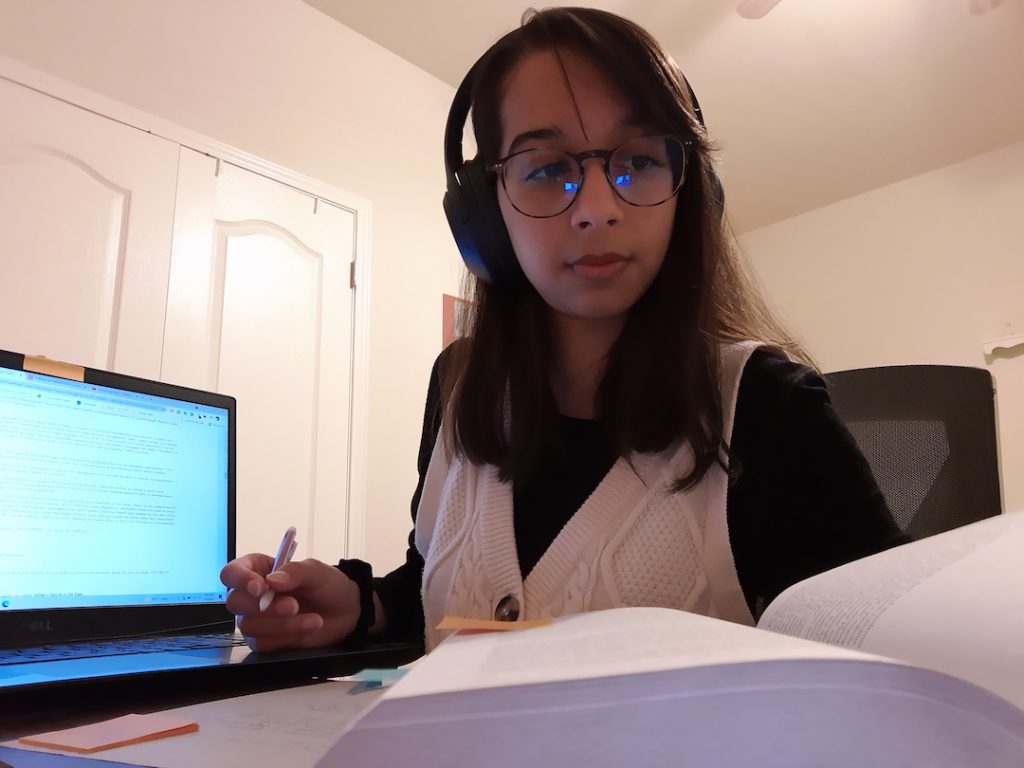Graphic by Kate Korepova
Story by Gloria Nguyen
Edited by Pete Ramirez
Finals season is here. It’s time for us to push through the last few weeks of the semester and finish off in a positive way.
With final projects, essays and tests to worry about, this time of year can be extremely hectic and stressful for students. It can be daunting to find motivation during finals week when all you want to do is cuddle under a thick blanket and drink hot chocolate, but don’t let yourself off the hook just yet!
To help you survive finals week, we’ve gathered tips and preparation advice from Austin Community College students and academic coaches.
ACC student, Victoria Regalado, keeps the studying habit of slowly exposing herself to the content of her class over time.
Regalado likes to run through the materials posted on Blackboard before class to become familiar with what her professor is going to talk about. This practice keeps her engaged with the materials that may appear on future tests and lessens the burden of cramming in all the concepts at the last minute.
Like most students, Regalado has had some difficulties preparing for her finals in the past. Last semester was Regalado’s first semester at ACC and she admits she did not know how to prepare for exams or what to expect during finals.
“I was in a class where we weren’t given that many details about what would be on the final, so I had no idea what to focus on,” Regalado said. “I was freaking out.”
To push through that difficult time, Regalado reached out to her classmates to exchange the information they had about the finals. She also looked over past exams to try to identify the professor’s testing style.
“It’s kind of comforting to know that many people are on the same boat with you,” Regalado said. “We helped each other and the final results turned out well.”
Being an engineering major at ACC demands Alya Mansoor to be a strict planner. Mansoor says she works on school work from the afternoon until evening time.

“A big thing that I do to keep the balance between my work life and study life is to create a structured schedule,” Mansoor said. “At the beginning of the school year, I’ll get a big calendar and write down all of my deadlines for homework and exams. As time goes on, I’ll fill in things that pop up too”
This calendar helps her keep track of due dates and allows her to plan out her work ahead of time.
To study for finals, Mansoor formulates a study plan catered to each class based on previous exams and the professor’s formatting. If she has an upcoming textbook-heavy exam, she will focus on her textbooks and support her studying by reviewing notes and homework.
“If I have an exam that relies on homework and practice, like Calculus, I’ll work through problem after problem and review my notes again.”
For a cumulative exam, Mansoor takes a different approach. “That’s a longer process and I have to start ahead of time and pay close attention to the course materials from the beginning of the class,” Mansoor said.
Because Mansoor says she fidgets frequently and is not good at concentrating for long periods of time, she uses the Pomodoro technique to study productively.
Using this method, you break down your working time into 25-minute chunks (pomodoros) separated by five-minute breaks. After about four pomodoros, you take a longer break of about 15 to 20 minutes. This technique can help anyone who feels distracted or overwhelmed to focus their attention on the task at hand.
“I’m using the Pomodoro method and I’ll keep using that,” Mansoor said. “It helps me keep my concentration better, especially for something big like finals.”
Sherry Yang, an academic coach at ACC, notices that a common mistake students make when studying for finals is procrastination.

“Some students didn’t plan ahead and didn’t know how much time they needed to prepare for finals,” Yang said. “In worse cases, some students barely studied until the final days.”
This habit of barely studying leads students to cram all the information at the last minute and results in poor retention of the material and lower test scores.
“If you try to stay up late to memorize as much as you can, usually you’re going to feel tired the next day and not going to remember a lot of information,” Yang said.
When students come to Yang for advice, she recommends at least two weeks to prepare for a big test.
“Let’s say if they have a test on Friday from 2 p.m. to 3 p.m., we recommend students to study in the afternoon from 2 or 3 o’clock for the two weeks before the final,” Yang said. “That way, you can get used to doing those kinds of subjects in that time frame. On the actual test day, you’re not going to get super anxious and stressed out.”
This semester, ACC has been hosting a mix of in-person and virtual classes. For either type of class, Yang recommends familiarizing yourself with the environment you are going to be in during your exam.
“If you’re going to take your test in front of your desk, you’ll want to study in front of your desk a while before the exam day,” Yang said. “If you’re going to take a test in a class, it might be better to study in a library or a public place. If you get too comfortable studying at home, taking a test in a different environment with people around may make you feel anxious and overwhelmed.”
Preparing for your final exams can be overwhelming, especially during the ongoing challenges of the pandemic. If you have had difficulty studying for finals, book an appointment with ACC academic coaches at their website. Academic coaches are available on several campuses district-wide.
Good luck to everyone with your finals!



